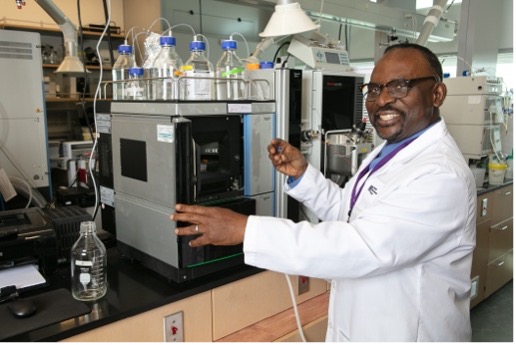A Knowledge Base to Make a Difference

Alfred Fonteh, PhD
Associate Professor, Clinical and Translational Neurosciences
Biomarker and Neuro-disease Mechanism Laboratory
Dr. Fonteh’s connection to HMRI’s Brain Aging Study is deeply personal; it embodies many of his lived experiences dating back to his childhood in Cameroon, Africa, where his interest in science began. As a boy, he would sit to watch the planes fly overhead, initially inspiring him to become a pilot. However, during secondary school, his future trajectory changed when he met missionaries from Europe and America who were passionate about life sciences. They taught him to observe the biochemical processes to truly understand the body and nature, igniting his scientific passions.
His interest in aging began when he observed a considerable difference in how his grandmothers aged. In Africa, his maternal grandmother lived to be 104 years old, while his paternal grandmother only lived to age 74. He contemplated the salient disparities throughout their lifespan.
His paternal grandmother became a widow in her twenties, raising her five children alone. Dr. Fonteh explained that where he is from, widows are looked down upon, and the community despises them. As a young widow, she lacked social support, a sense of community, and access to adequate nutrition while also enduring high amounts of stress. On the other hand, his maternal grandmother was married to her husband for over 80 years; she was highly respected and loved in the community, had low stress, and had access to good nutrition, including a lot of fish.
Early in his career, Dr. Fonteh used state-of-the-art technology to characterize lipids critical to human diseases at Wake Forest University School of Medicine, where he was a research associate and professor of Internal Medicine. He learned about HMRI’s early research on Alzheimer’s disease (AD), which showed inflammatory changes associated with lipids in cerebrospinal fluid (CSF) using 2D-gel electrophoresis. This intrigued Dr. Fonteh, so he requested samples of CSF from HMRI to conduct advanced chemistry analysis using Gas Chromatography/Mass Spectrometry (GC/MS). His results showed promising changes in lipids and enzyme activity in AD.
His interest in the institute’s clinical studies grew. In 2001, he joined the HMRI research team, where, over two decades later, he continues gaining new insights into biomarkers and the early detection of AD. “Innovation means making a difference in people’s lives,” said Fonteh. “Currently, there is no easy way to predict, detect, or treat AD, but there is hope for a different future using higher technology like mass spectrometry to measure compounds in the body.” He finds satisfaction in investigating the differences between people who age normally and those who develop AD. “This is why I get up every morning excited to come to HMRI – I have a knowledge base to make a difference.” The overall direction of Dr. Fonte’s research is showing that metabolic changes occur decades before cognitive and memory problems are detected in older adults. Therefore, there is a possibility that lifestyle changes can delay the occurrence of brain diseases, including Alzheimer’s.